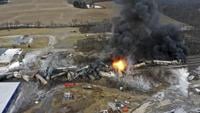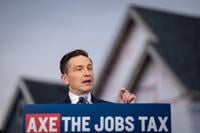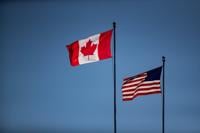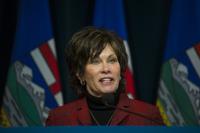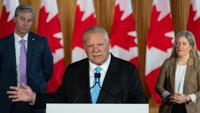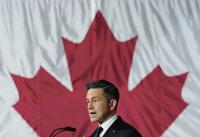A post by Saskatchewan’s premier says removing the carbon charge on home heating was responsible for a significant slowdown in inflation in the province. This is misleading, because removing the carbon charge on home heating was just one of several factors pushing Saskatchewan’s headline inflation number down. Experts also say the one-time change will not have an effect on inflation in the long run, as the underlying pressures causing inflation remain.
Saskatchewan stopped collecting the carbon charge on home heating in January. The change came after the federal government exempted users of home heating oil from paying the carbon tax, mainly affecting residents in Atlantic Canada.
On Feb. 20, Saskatchewan Premier Scott Moe said , formerly known as Twitter, the province’s decision to remove the carbon pricing on home heating “dropped SK’s inflation rate in Jan to 1.9 per cent, down from 2.7 per cent in Dec and well below the national rate of 2.9 per cent.”
Rating: Misleading
“The way that he worded the claim implies the entire reduction from 2.7 to 1.9 (per cent) was due to the carbon tax removal on home heating, and that's not the case,” said University of Calgary economics professor Trevor Tombe.
Moe’s post references , which states: “In Saskatchewan, the collection of the carbon levy ceased in January 2024, contributing to the province's year-over-year price decline of natural gas (-26.6%).”
Removing the carbon charge on home heating contributed to the drop in Saskatchewan’s overall inflation rate, confirmed Statistics Canada spokesperson Annick Irakoze in an email. However, it wasn’t the only factor, she said: The price of natural gas was the second largest contributor to the slowdown, while gasoline prices were the largest contributor.
That was also the case on a national basis, according to Statistics Canada’s inflation report. The largest contribution to the national decline in the year-over-year inflation number was lower prices for gasoline, down four per cent year over year. But even with gasoline excluded, inflation slowed in January. Statistics Canada says other factors that contributed to the decline were slowing inflation for groceries and lower prices for airfares and travel tours.
Therefore, it’s misleading to claim removing the carbon charge dropped Saskatchewan's inflation rate in January to 1.9 per cent.
“Certainly, removing the carbon tax had a big effect on natural gas prices in Saskatchewan,” noted Tombe, but he said that according to his calculations using Statistics Canada data, the year-over-year decline in natural gas prices in Saskatchewan was responsible for 0.3 percentage points of the province's drop in headline inflation from 2.7 per cent to 1.9 per cent.
“The premier is not so explicit, but (the post) is written in a way that might lead someone to conclude that the reason why Saskatchewan has a full percentage point lower inflation than the national average is because of the removal of the carbon tax," Tombe said.
Asked to comment on the post's wording, Saskatchewan government spokesperson Matthew Glover pointed ��ɫֱ��to a from the same day that states removing the carbon charge "helped reduce" the province's overall inflation rate. The government has removing the carbon tax would save the average family around $400 in 2024.
were down 4.5 per cent between December and January on a national basis, according to Statistics Canada, but Saskatchewan saw a much bigger at 25.5 per cent. That's compared with a decline of 4.6 per cent in Quebec, for example, or 2.7 per cent in Alberta.
The month-over-month drop in Saskatchewan's natural gas prices was due solely to the carbon levy's removal, said Statistics Canada's Irakoze, "as no other rates or fees changed in January."
Carbon tax and inflation
In the same tweet, Moe also said the carbon charge was more than a quarter of the cost of natural gas in Saskatchewan.
The carbon charge was not always a consistent proportion of a typical household’s total natural gas bill in Saskatchewan, Statistics Canada’s Irakoze said, as the proportion could change based on consumption, fluctuations in other components of the bill and the carbon pricing rate itself.
“However, since October 2023, the carbon tax has been roughly a quarter of a typical household’s total cost of natural gas in Saskatchewan,” Irakoze confirmed.
Moe’s post also implies removing the carbon charge across the board would help fight inflation.
“If the feds are actually serious about fighting inflation, they would scrap the carbon tax on everyone and everything,” he wrote.
However, it’s misleading to imply that removing the carbon tax has any long-term effect on inflation, said Stephen Gordon, a professor of economics at Laval University.
It’s a one-time change, and so it’s natural that for 12 months, inflation on natural gas will be somewhat lower on a year-over-year basis. But once the 12 months have passed, the absence of the carbon charge won’t affect inflation going forward, he said.
“This is a one-off and targeted decrease in price,” Gordon said.
“The basic issue is interpreting that one-time decrease as … inflation is now solved in Saskatchewan. No, because the underlying pressures are still there.”
Tombe agreed.
“It's taken as kind of a point of evidence that carbon taxes are driving inflation, and I think that's the wrong conclusion. Carbon taxes affect prices, no doubt, but they are not a meaningful contributor to inflation at all, even in Saskatchewan,” he said.
Asked to comment on this, Glover said the carbon tax is "one of a number of factors that drives inflation, but it is a significant factor because it affects goods at every step of the supply chain. Removal of the carbon tax, as demonstrated with natural gas in Saskatchewan, would help to bring inflation down."
Sources
()
()
()
()
()
()
About ��ɫֱ�� Press fact checks
You can find out more about ��ɫֱ��here and about ��ɫֱ�� Press Fact Checks here. To reach our fact-checking team with any tips, corrections or comments, please email us at cpfactcheck@thecanadianpress.com.








